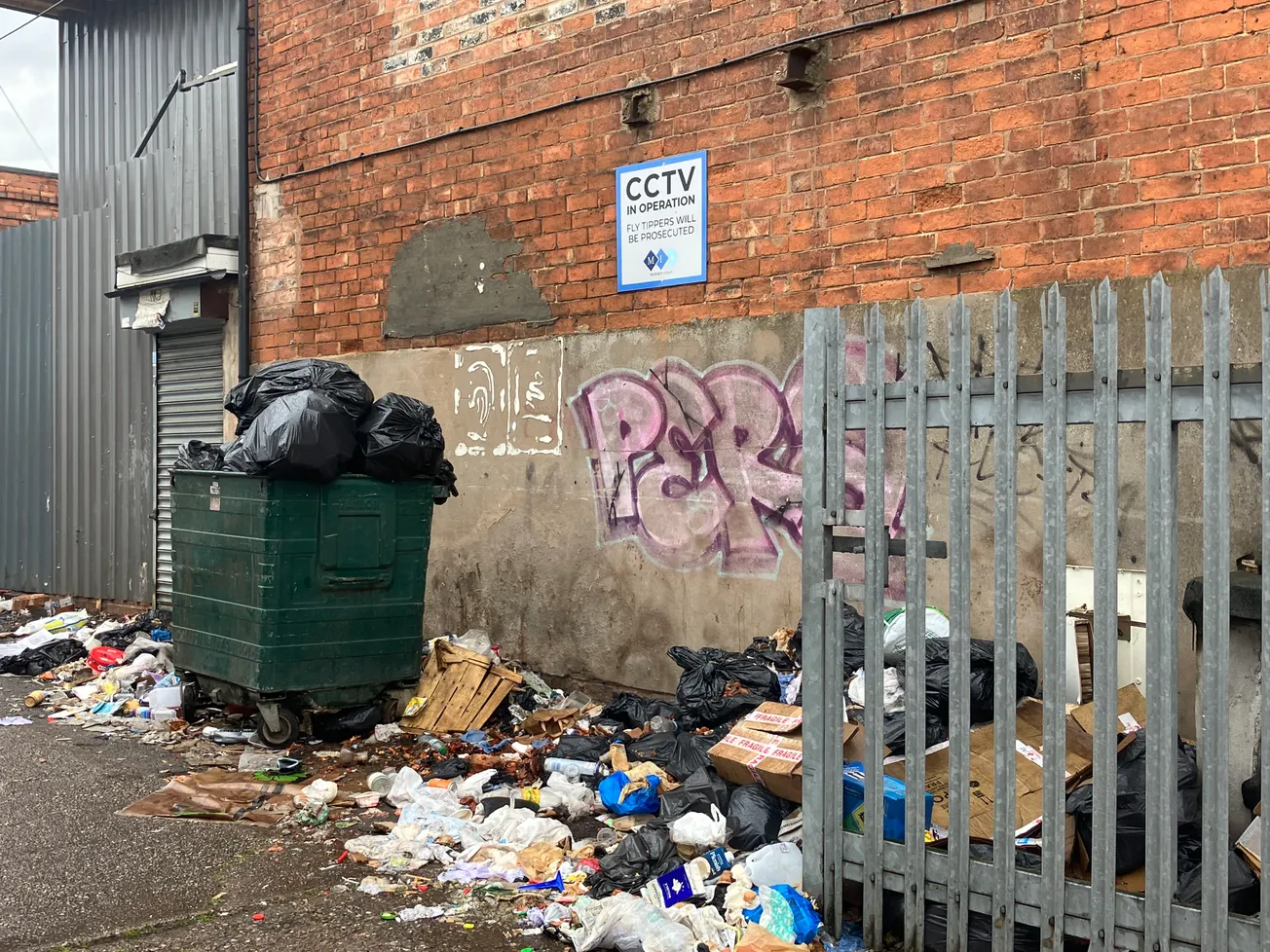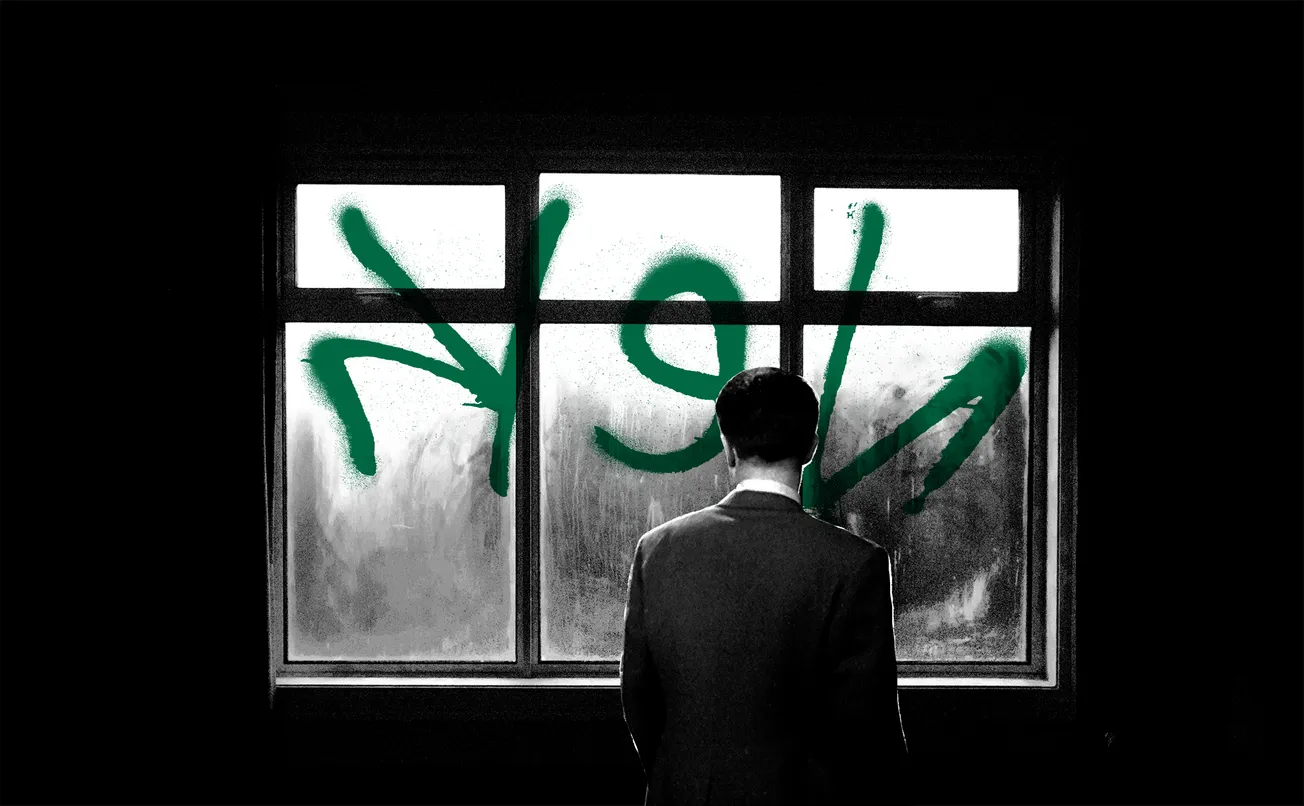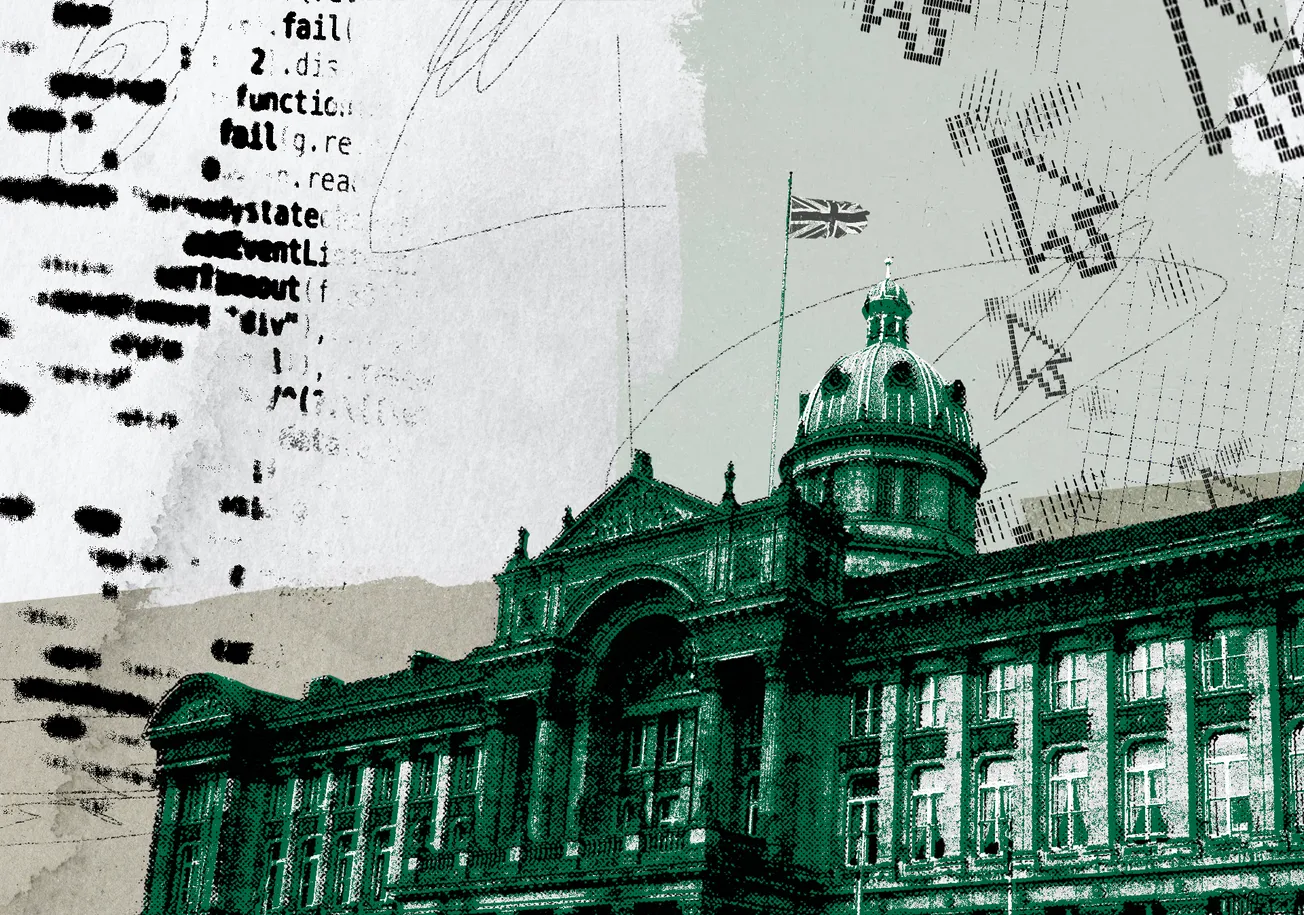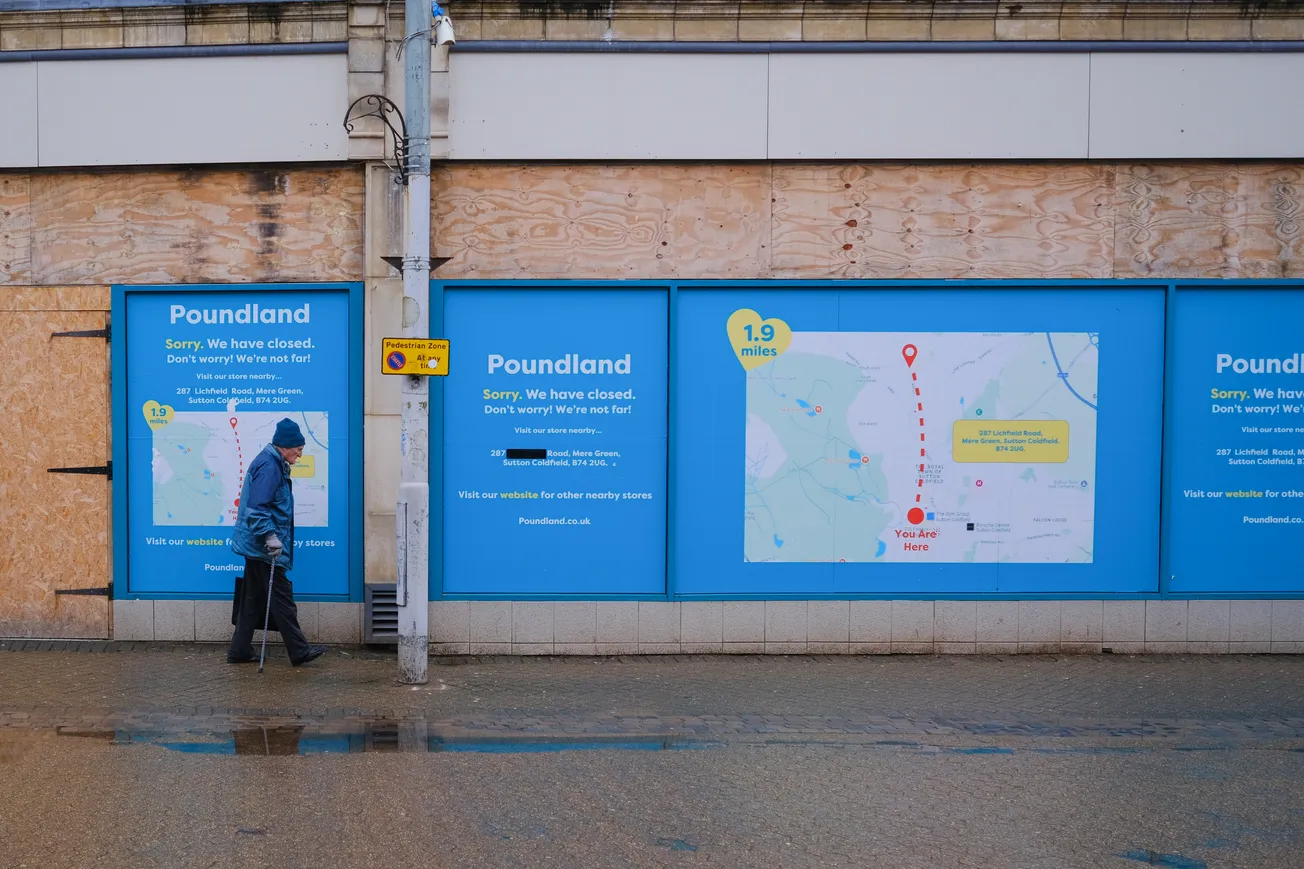The first thing I spot is a massive, torn, ‘Vote Labour, Yardley’ sign covered in rubbish and fly-tipped chairs as I walk down Coventry Road in Small Heath. To many residents, this scene is fairly representative of a set of problems that have emerged recently. Many local activists and community leaders have told The Dispatch that despite the presence of agency workers, and the ‘normalisation’ of the strike so that refuse workers can’t block trucks leaving depots, their rubbish hasn’t been picked up for months.
I’ve heard from members of Small Heath Community Forum that almost all of the neighbourhood’s roads are experiencing ‘dropped’ streets, where bin trucks and workers decline or fail to pick up rubbish. (This is different to a ‘missed collection’ where residents miss their collection slots, mostly through human error, i.e not putting their bins out in time). Evidence of these dropped collections, or unpicked up bins, is everywhere in Small Heath: great piles of rubbish, like black cairns, dot the landscape. Where the evidence of these dropped collections is not appearing, however, is in council data, according to neighborhood activists I talked to on the phone and a Freedom of Information (FOI) request seen by The Dispatch.
Much of the national media has streamlined the story of places like Small Heath — pointing to the area’s mounds of refuse as direct evidence of the strike. But things aren’t that simple. Despite the strike taking place across the whole of Birmingham, ten minutes down the road in places like Sheldon there are no iconic piles of black bags to be seen. Agency workers, drafted in to make sure rubbish is still picked up, seem to have left Sheldon’s streets spotless. (To be fair, Sheldon is dominated by semi-detached 1960s houses, whereas Small Heath is characterised by dense Victorian terraced housing, tiny streets and an explosion of houses of multiple occupation (HMOs). These structural differences probably go some way to explaining the disparity between the two wards.)
But while Sheldon is much tidier, registers of dropped collections there are 3.4 times higher than in Small Heath, which is covered in rotting rubbish. According to a Freedom of Information (FOI) request seen by The Dispatch, between January and April 2025, Small Heath had dropped collections on 147 roads, while nearby Sheldon registered a staggering 504. One theory doing the rounds is that Small Heath is being deliberately deprioritised by the council, because residents are less likely to complain — keeping the numbers of dropped collections lower. And some believe their local representatives should be doing more. A common refrain on Coventry Road is that councillors Shabina Bano and Saqib Khan are “MIA (Missing in Action).”
Both Bano and Khan started out as the latest in a long line of Labour councillors in the area. But they have famously been in conflict over alleged misogyny and bullying for a number of years, resulting in Bano defecting to the Liberal Democrats, and Khan being found by a council panel to have ‘disrespected’ Bano. A few months ago, Bano was admitted to a stroke ward, with councillor duties reputedly taken over by Shaukat Ali Khan.
Others point to overlapping issues that have exacerbated the situation: an explosion of illegally dropped kerbs and dangerous parking that prevents refuse trucks from accessing residential roads. And poor English language skills and lack of internet preventing people from making complaints to the council.
In one afternoon in Small Heath, I spotted over a hundred cars parked on double yellow lines, twenty vehicles dumped on pavements and several double parked in the road. This could have been a bonanza for an ambitious parking warden, yet very little enforcement seems to go on in Small Heath. I also spotted dozens of dropped kerbs in progress, with masonry spilling out into the streets.
All this, plus Birmingham’s overreliance on cars, has led to absolute gridlock. At around four in the afternoon I watched one car move about four metres in the space of half an hour. Any rubbish collectors trying to get into Small Heath during traffic like this might well be put off. But that still doesn’t explain why the dropped collections — which I see plenty of evidence for — aren’t showing up in the data.
As I’m taking a photo of the derelict Labour sign, Jaidi, the owner of Juices4You comes out and points at a pile of rubbish: “this ain’t been collected for a month. They should come twice a week. I paid money for this, I have a contract with the council for this. Make sure you include that in your piece.”
On the nearby Charles Road, I speak to the owner of 4You Barbers about the wall of black bin bags outside his shop: “been here about 1 month, a long time, I dunno. We keep complaining.” On Dora Road, things are a bit better, according to the owner of Parkside Real Estate his current mountain has only been there for ten days. “What I don’t get is they cleared half the rubbish and left the other half,” he tells me.
What’s even stranger is that the FOI request seen by The Dispatch claims that: “all roads were collected within 72 hours or the following collection date [after the dropped registration].” So why are local shop owners and residents complaining that their rubbish is often missed for periods between a week and a month? From a brief walk around Small Heath, it seems that it is the side roads — Charles, St Oswalds, Dora, Mansel — nearer the park that are suffering from the worst rubbish, with less refuse the closer they get to Bordesley Green.
One source, who is a long-term community activist in Small Heath and didn’t want to be named, tells me that he has witnessed six consecutive weeks of dropped collections where he lives on Dora Road. Through a series of emails, seen by the Dispatch, he makes the case to Councillor Majid Mahmood (who is responsible for waste at the council) that refuse trucks are getting to his street, despite the traffic, but failing to pick up rubbish.
Quite why an agency bin collection team would make it to a street and then decide not to pick up the rubbish present is unclear. One theory that The Dispatch has heard is that trucks, which are fitted out with cameras, do this to complete a route but skip the rubbish collection to save on time.
Mahmood replies to our source that: “there is an access issue on the road. If you have evidence to the contrary please let me [know] ahead with the time that the photo was taken so I can discuss with the depot. Unfortunately there are a few roads in the city where inconsiderate parking is [present] such as double parking which is a safety issue for the staff so unable to continue with the collection. Our staff have no reason whatsoever to drop a collection.”
The Dispatch has seen time-stamped images of bin lorries on Dora Road, so some level of access to Small Heath’s roads is clearly achievable. The source's account was corroborated by Basmin Khan, a member of the Small Heath Community Forum, and another local source who have both claimed that roads are simultaneously not being cleared and not being registered as ‘dropped.’ All dropped roads have to be ‘actioned’ within 72 hours, guaranteeing clean streets. Yet Small Heath, which reportedly has a much smaller number of dropped collections than wealthier wards like Sheldon, is drowning in rubbish.
Birmingham City Council replied to our request for comment with the following: “during the last 3 weeks the Council has not been able to collect waste due to Unite the Union picketers and protestors blocking our refuse trucks from leaving our depots. However, since the interim injunction has been in place, our crews have now been able to leave depots to remove the waste backlog. We appreciate residents’ patience under these difficult circumstances.”
Cllr Saqib Khan responded to our request for comment, saying: “Throughout the bin strike I have been working with residents to ensure that any missed collections are reported to the council. I’ve also been working with local litter-picking groups to help to clean our streets up. Thanks to our Labour Council, Labour Mayor and Labour Government working together the backlog of waste was cleared. I will continue to work with residents and community groups to make Small Heath cleaner for everyone.”
Meanwhile, councillor Bano told The Dispatch that: “The ongoing strike has made an already difficult situation much worse. While some areas have seen slight improvements over the past fortnight, many streets—especially those with persistent double parking—are still suffering from missed collections…I have raised these issues repeatedly with the Cabinet Member, Cllr Majid Mahmood, our residents deserve better. Labour may have considered Small Heath a stronghold for years, but they have clearly taken the area for granted.”








Comments